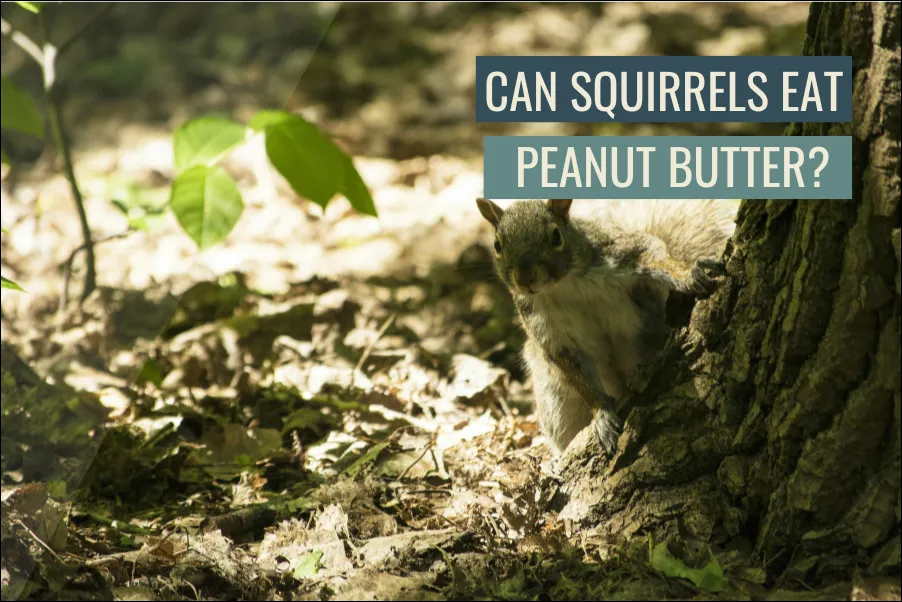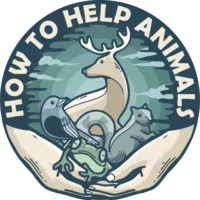
Your local squirrels seem to eye every snack with interest, and you wonder if that jar of peanut butter in your pantry could make a good treat for them. After all, it’s made from peanuts, and squirrels love nuts – but is peanut butter actually safe for these backyard visitors?
Squirrels can eat small amounts of natural, unsalted peanut butter safely, but it should only be offered occasionally as a treat. Commercial peanut butter often contains added sugars, salt, and preservatives that can be harmful to squirrels in larger quantities.
Why Natural Peanut Butter Can Be Safe
Pure peanut butter made from just ground peanuts provides protein and healthy fats that align reasonably well with squirrel nutritional needs. Unlike toxic foods such as chocolate, peanut butter doesn’t contain compounds that are inherently poisonous to squirrels.
The high fat content in natural peanut butter can actually benefit squirrels during certain seasons, particularly fall when they’re building energy reserves for winter. These calories help support their active lifestyles and metabolic demands.
Natural peanut butter contains vitamin E, niacin, and magnesium – nutrients that support squirrel health when consumed in appropriate amounts. However, these benefits only apply to pure, additive-free versions without harmful extras.
The Dangers of Commercial Peanut Butter
Most store-bought peanut butter contains added sugar, which can disrupt squirrel blood sugar levels and contribute to dental problems. These simple sugars provide empty calories that fill squirrels up without delivering essential nutrients.
Salt content in commercial varieties poses serious health risks for squirrels, whose kidneys aren’t designed to process high sodium levels. Excessive salt can lead to dehydration, kidney stress, and electrolyte imbalances.
Preservatives and stabilizers commonly found in processed peanut butter can cause digestive upset in wildlife. Xylitol, an artificial sweetener found in some brands, is extremely toxic and can cause liver damage or death in small animals.
Proper Serving Sizes and Frequency
When offering peanut butter to squirrels, think in terms of tiny amounts – no more than a small dab on the tip of a spoon per squirrel per week. Their small size means that human-sized portions represent massive meals that can cause digestive problems.
The sticky consistency of peanut butter can pose choking hazards if offered in large quantities. Squirrels may have difficulty managing thick, adhesive foods that don’t occur naturally in their environment.
Unlike safer options like fresh grapes or appropriate nuts, peanut butter should remain an occasional treat rather than a regular food source. Overfeeding can lead to nutritional imbalances and reduced foraging behavior.
Comparing Peanut Butter to Whole Peanuts
Whole, unsalted peanuts provide many of the same nutritional benefits as peanut butter without the processing concerns. Raw peanuts offer protein and healthy fats while encouraging natural chewing behaviors that support dental health.
The shell-cracking activity involved with whole peanuts provides mental stimulation and mimics natural foraging behaviors. This engagement keeps squirrels active and prevents the dependency issues associated with easily accessible processed foods.
Storage behaviors differ significantly between whole nuts and peanut butter. Squirrels can cache whole peanuts for later consumption, supporting their natural food storage instincts, while peanut butter cannot be buried or stored effectively.
Signs of Peanut Butter Overconsumption
Watch for digestive upset including loose stools or diarrhea, which may indicate that a squirrel has consumed too much rich food like peanut butter. Their systems can become overwhelmed by high-fat foods in excess.
Reduced interest in natural foods may signal that easy access to calorie-dense treats is interfering with normal foraging behaviors. Healthy squirrels should maintain diverse dietary habits rather than focusing on human-provided foods.
Lethargy or changes in normal activity patterns could suggest digestive stress from inappropriate feeding. Unlike harmful foods such as bread that provide no nutrition, peanut butter excess typically causes temporary discomfort rather than serious poisoning.
Alternative High-Protein Treats
Unsalted tree nuts like walnuts, almonds, and hazelnuts provide excellent protein and fat content without the processing concerns of peanut butter. These natural foods align perfectly with squirrel dietary preferences and nutritional needs.
Seeds from sunflowers or pumpkins offer protein and healthy oils while encouraging natural eating behaviors. These options provide variety and prevent over-reliance on any single food source.
Fresh foods maintain their nutritional integrity better than processed alternatives, ensuring that squirrels receive maximum benefit from any treats offered. Natural options also decompose safely if left unconsumed, unlike sticky processed foods.
Seasonal Considerations for Peanut Butter Feeding
Fall represents the most appropriate time for offering high-calorie treats like peanut butter, as squirrels naturally seek energy-dense foods to prepare for winter. The extra calories can supplement their natural nut-gathering activities during this critical season.
Spring feeding should focus on lighter options as squirrels transition to fresh vegetation and naturally available foods. Heavy, rich foods like peanut butter may interfere with their natural dietary shifts during this renewal period.
Summer heat can cause peanut butter to become rancid quickly when left outside, creating potential health hazards. If offering peanut butter during warm weather, ensure it’s consumed immediately or removed promptly.
Safe Application Methods
Spreading tiny amounts of natural peanut butter on tree bark or wooden surfaces allows squirrels to lick it off gradually, reducing choking risks while providing enrichment. This method mimics natural foraging behaviors more closely than large globs.
Mixing small amounts with appropriate dry foods like unsalted nuts can dilute the consistency while maintaining nutritional benefits. This approach reduces the sticky texture concerns while providing variety.
Never leave large quantities of peanut butter accessible, as multiple squirrels may overconsume or become territorial around concentrated food sources. Small, controlled offerings prevent competition and health problems.
Understanding Individual Squirrel Tolerance
Some squirrels may show sensitivity to peanut products, just as humans can have allergies. Watch for unusual behaviors or symptoms after initial offerings and discontinue if any adverse reactions occur.
Age affects tolerance levels, with young squirrels being more sensitive to rich foods like peanut butter. Adult squirrels generally handle occasional treats better than juveniles whose digestive systems are still developing.
Previous dietary experiences influence how well individual squirrels process new foods. Urban squirrels accustomed to varied diets may tolerate peanut butter better than rural populations with strictly natural diets.
Creating Balanced Feeding Programs
Peanut butter should represent only a tiny fraction of any feeding program, with the majority focusing on natural foods that support squirrel health. Variety ensures balanced nutrition while preventing dependency on processed foods.
Understanding natural squirrel foraging patterns helps create feeding schedules that supplement rather than replace their instinctive behaviors. This approach supports wildlife while maintaining their natural survival skills.
Educational components help family members understand appropriate amounts and frequencies for treat offerings. Knowledge prevents well-meaning overfeeding that can harm rather than help local squirrel populations.
